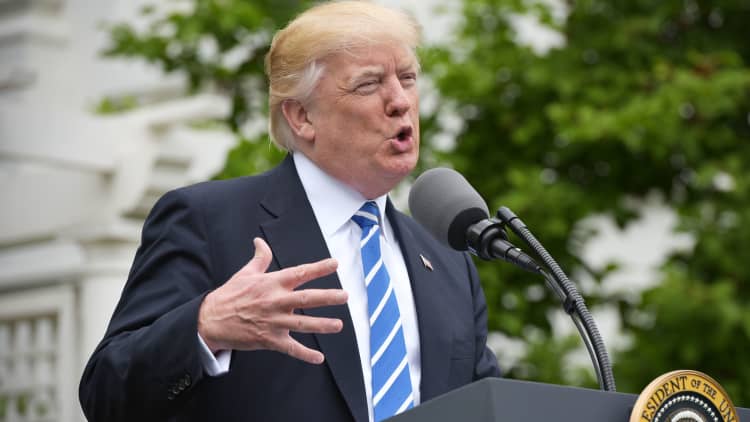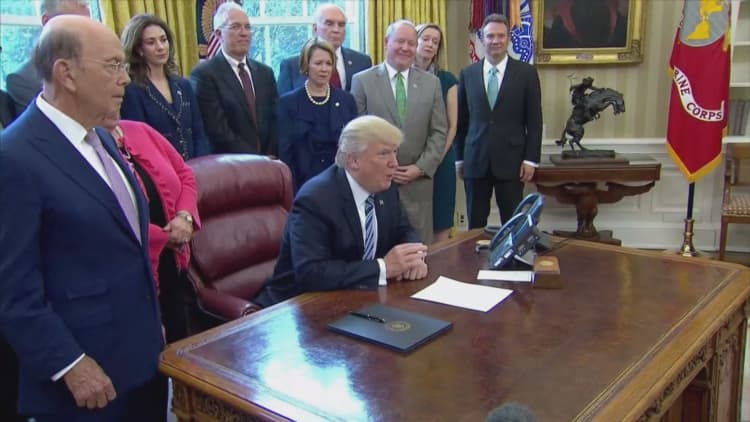
Banking analyst Dick Bove, frustrated by a government that he believes has exercised socialist-style control of the banking system, believes it's finally time for big Wall Street institutions to consider breaking up.
The vice president of equity research at Rafferty Capital Markets long has been a proponent of the big banks, arguing that they keep the U.S. competitive globally.
However, he recently has been worried that investors were misunderstanding what was happening with banks and were buying them earlier this year without considering longer-term ramifications — particularly a government hostile to big institutions and economic trends not favorable to financials.
With the less-than-welcoming environment, Bove thinks the Wall Street titans themselves need to rethink the future.
"The time to consider breaking up these companies is here," Bove wrote in a note to clients. "The time for the industry to develop a vision is here. The time to continue to be buried in government by agencies that lean toward socialism and not capitalism and democracy is not likely to end. Banks must take control of their destiny if their stocks are going to do well."
Recent developments have helped fuel the sentiment.
A Michigan lawsuit alleging that the Federal Housing Finance Agency is unconstitutional could endanger Fannie Mae and Freddie Mac, the two agencies that backstop mortgages on the secondary market. The FHFA oversees the two government-sponsored enterprises. If successful, the suit would throw the existence of Fannie and Freddie into question and get the government out of the mortgage finance business.
In a related matter, Bove pointed to a Moelis & Co. report showing the government made just shy of $100 million from Fannie and Freddie since the financial crisis, a development he interprets as further evidence to fuel the government's desire to nationalize the mortgage market.
"This may be some type of hybrid socialism but this country is not going to give this system up in a desire to return to pure capitalism — a system that it no longer trusts," Bove wrote. "Thus, despite the lawsuits, the banking industry must look to its own resources to avoid more onerous regulation."
President Donald Trump has made no secret of his antipathy toward Wall Street.
During last year's campaign, Trump endorsed a reprisal of the Glass-Steagall law that separated investment from commercial banking. More recently, the president said he is "looking at" breaking up the banks, though what form that would take is unclear.
To some extent, banks have no one to blame but themselves, Bove said. Rather than focus on raising value and growing organically, executives have been more focused on returning cash to shareholders and inflating stock prices, he charged.
"It is clear what the government wants. It wants smaller, monoline financial companies to operate the system. This is what investors would appear to want. The time has come to give both interested groups what they want," Bove said. "Moreover, since bank managements do not know what to do with their capital, they should be broken up. I do not believe that this would be good for the United States but it is what everyone wants."
To be sure, Bove acknowledged, as have other analysts, that smashing up the institutions into smaller pieces could create value in its own way. They would face lower regulatory barriers and would be free to focus on other endeavors than making buybacks and issuing dividends.
Moreover, he thinks in the current environment banks simply may have no other choice.
"For the 50-plus years that I have been doing this job, I have always believed that large multi-product banks backed by a multifaceted system of protection has served this country and its financial system unusually well. History would clearly support this judgement (compare the 20th century to the 19th century in banking)," he said.
"However, the government no longer wants the multifaceted back-up that has protected the financial system. It has ripped it apart. It no longer wants banks that are able to compete in the global financial arena. It is forcing the biggest banks to shrink."
The government is in the process of examining regulations across the board, including the Dodd-Frank reforms put in place after the financial crisis.
However, most of the relief is expected to be geared toward community and regional banks rather than the big Wall Street firms.
WATCH: Trump talks about why he thinks it would be better to separate the largest banks.



